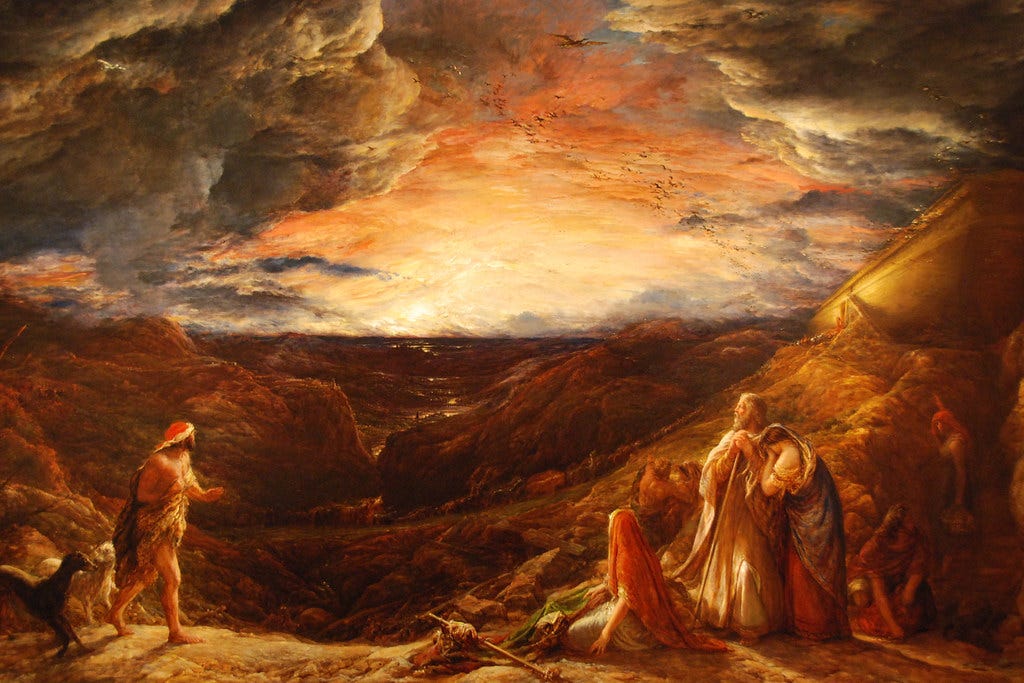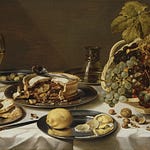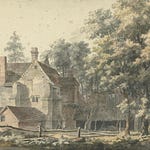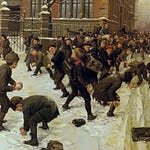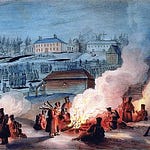Our Word of the Week, pilgrim, is a dramatic one, involving some action, even danger, so it’s fit that I introduce it with a scene. The new man in town, a lawyer, has made a shingle to hang outside and say so. One of the local ranchers, a man who has wrested a living from the soil and from blood and sweat – not always his own blood and sweat – looks at it with bemusement, and a touch of contempt.
“You’re a persistent cuss, pilgrim. You really aim to hang that up outside somewhere?”
“That’s why I painted it,” says the lawyer.
“Well, take some advice, pilgrim. You put that thing up, and you’ll have to defend it with a gun. And you ain’t exactly the type.”
That’s a moment from what I consider the greatest western ever made, The Man Who Shot Liberty Valance (1962), and the rancher’s habit of speech, his calling his rival PILGRIM was so seared into the memories of moviegoers, that from that time on, anyone impersonating John Wayne would have to drawl out that word. It would be PILGRIM this and PILGRIM that, though, as far as I know, this was the only film in his long career in which the Duke ever used the word.
But it was an apt use, because the lawyer (Jimmy Stewart) had come like a PILGRIM from out east, bringing books and civilization and law to the still half-savage territory; and he did and did not belong there. The future would be his: he will become a senator when the territory gains its statehood, and he will bring schools and roads and railways and the habits of peace. He will win the girl, too – and yet, as the director John Ford shows us, he was probably not the better man.
The PILGRIM, in American folklore, is not someone who travels to a holy place, but rather someone who leaves his home behind, to seek his fortune elsewhere, or even to bring his home and his way of life with him to transform the place he goes to. There’s something of the missionary about him, and that’s the case even when he is not preaching the word of God. In The Man Who Shot Liberty Valance, the lawyer Ransom Stoddard is a missionary of civilized ways, as against the lawlessness of the place he never does quite make his own. The progressive is often this kind of PILGRIM: homeless, restless, bringing great things or at least things he believes are great, and often strangely careless of the peculiar beauty or grandeur of the place to which he brings them.
But that’s a reduction of the word. The life of man is essentially a PILGRIMAGE, as Saint Augustine said long ago, because we have no settled home here on earth. God has not made it so. “Our hearts are restless,” said Augustine, “until they rest in Thee.” We go here, we go there, with nowhere to lay the burden of our longing, and if we cease it is not because we are satisfied, but because we have lost heart. Now imagine the longing for God, translated as it were and reduced, deformed, into a longing for a paradise on earth to be brought about by political change. How much enmity and resentment that deformed longing must engender! And no end, no rest.
But the ancestors of our word PILGRIM have to do with travel for a religious purpose. Latin PEREGRINUS literally meant “one who wanders across a field,” from Latin AGER, FIELD – hence AGRICULTURA was the TILLING OF A FIELD. English ACRE is a cousin of that part of the word, as is German ACKER; hence the German name ACKERMANN is equivalent to the English name FIELDER. The name of PEREGRINUS, which became PELERIN in French and PELLEGRINO in Italian, referred specifically to one class of PILGRIM: those who took to the FIELDS and made their way overland to the shrine of Saint James, at Compostela in Galicia. That journey was arduous enough. You’d have to cross the Pyrenees, though along the way you found many churches that were stopping places for the PILGRIMS, such as the magnificent cathedral at Chartres in northern France. It all depends on where you were coming from, but there were dozens of towns from England and Germany and Italy and Austria to Spain itself, that fairly cried out, “PILGRIM, take a rest here for a bit!” For there was nothing more exciting and colorful than a real pilgrimage; good for the body, and grand for the soul.
Dante, who went on a pilgrimage or two, adds that a PALMER (Italian PALMIERO) was someone who made his pilgrimage to the Holy Land, bringing back palm branches, reminiscent of the time when Jesus entered Jerusalem and the people strewed his path with them, and a ROMEO was someone who went to Rome, to venerate the sacred relics there, especially the Veronica, that is, the cloth that wiped the face of Jesus as he carried the Cross up the mount of Calvary. So, if I may butcher the Bard, when Juliet asks, “Romeo, Romeo, wherefore art thou Romeo?” he might answer, “It’s all on account of my uncle Vincenzo, who went to Rome to see the Veronica.”
In a broader sense, the Christian faith itself is a PILGRIM faith, because it is aimed at things hoped for, things not yet in our sight. So, says the apostle to the Hebrews, Abel and Enoch and Noah and Abraham and Sarah all beheld the promises of God from afar, and they greeted them, and confessed that they were PILGRIMS and strangers on the earth (Heb. 11:13). It is a sweet paradox, to consider that the best lovers of their homes on earth are those who do not demand more from them than they are able to give. These sweet homes are stations on the way; they are not the end.
Take advantage of the last day for our Blue Moon Super Discount on upgrades and gift subscriptions!
Word & Song is an online magazine devoted to reclaiming the good, the beautiful, and the true. We publish six essays each week, on words, classic hymn, poems, films, and popular songs, as well a weekly podcast, alternately Poetry Aloud or Anthony Esolen Speaks. To support this project, please join us as a free or paid subscriber.



